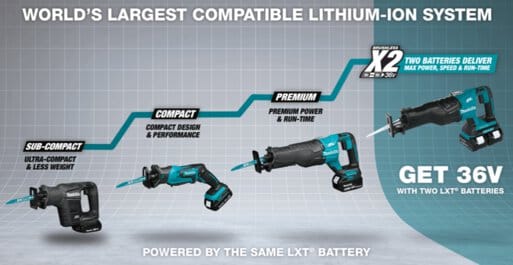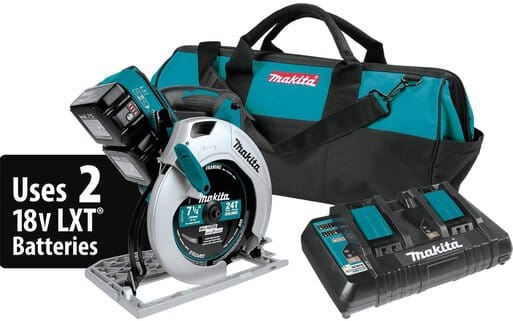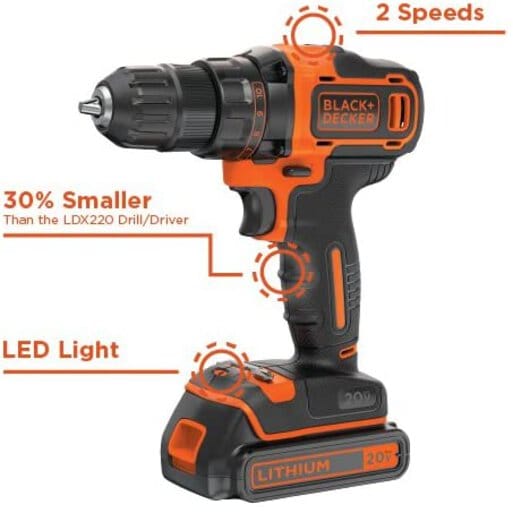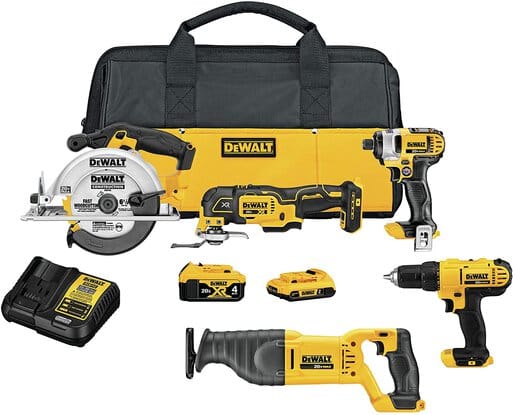Cordless Tools
In general - I have the same opinion across manufacturers of both. For quite some time, I resisted the urge for cordless, even though I had used some even when I was doing profressional remodeling work way back. Why? Batteries don’t last, and even today - they’re speciality items with specialty prices, although inside those expensive power packs - is really just a series of fairly-standard 1.5 or 3.7v lithium batteries (and they can generally be rebuilt yourself or you can have e.g. BatteriesPlus do it).
I did finally bite the bullet some time back and have been growing my cordless collection with a fury, although picking a single manufacturer is really in your best interest - over time, you wind up with numerous chargers and interchangeable batteries. When you think you need more batteries, buy a combo kit coming with (discounted) batteries - otherwise buy the bare tool you want.
Cordless and power tools in general is a big enough category I’ll cover it in depth separately here.
Cordless tool manufacturers
The big names here of note, including for the post part in professional contruction come down to Makita, DeWalt and Milwaukee There are a few others to consider, for example Festool, although they tend to be on the super expensive side of things, and Home Depot’s RIDGID lineup. Bosch is also a consideration in the ‘top tier’ as well, and Metabo is also generally well-regarded but doesn’t really have the full lineup of tools like Makita and friends.
You might notice my links above are all to the 18V tool lineups for each manufacturer, and that’s for good reason. There are 12v tools out there, using different battery packs, but the battery charges don’t last as long, the tools don’t make as much power, and except for some specific purposes, I don’t consider them to be needed, while the 18V tool lineups (or some with higher voltage, e.g. the Makita 36V system using 2x18V batteries, and DeWalt FlexVolts/60V systems) is pretty much the core system at the moment. You can add 12v tools into the system if you must, or if you think your needs can be met with the 12v lineups, I’d stick to the same manufacturers and see if you can meet all of your tool needs within the single 12V lineup from that manufacturer.
Makita and Milwaukee have both been in contractors boxes for a very long time, with DeWalt coming in slightly later - but these companies have been around since the 1910s or 1920s in the case of DeWalt. All three of these companies have their fanatical fans. Makita was the standard for circular saws long ago with the lightest and highest torque out there for quite some time and brought brushless motors to cordless tools a full decade ahead of DeWalt and others, while Milwaukee literally was the only name for reciprocating saws to the point of their Sawzall becoming a standard name for the tool. DeWalt - well, they do have good marketing, and their tools are solid, although they refuse to publish tool specifications and their '20V Max’ is actually identical to the 18V of other manufacturers and is pure marketing malarky based onbattery nominal vs max charge values.
Ridgid is a relative newcomer, pushed (created?) as the Home Depot brand, has generally solid reviews and a reasonable range of tools. I have had a few of their air tools, which generally performed well, although I have had some issues with a roofing nailer. I would put them a bit below the above, but sometimes they are lower priced and convenience of return is worth something, so they are still worth considering in the general ‘higher tier’ category overall.
Lower Tier Cordless Manufacturers
I have no doubt some will take affront at my listing of ‘everyone else’ and tell me how their Harbor Freight $23 cordless drill is the best thing ever. So be it. I consider the aforementioned list (Makita, Milwaukee, etc.) to pretty much be the standards for professional use, with a few specialty or European brands possibly missed, and everyone else to be in a lower tier - deal with it.
I have had a few HarborFreight cordless and cordless tools, among others, and in the cordless space, even when a tool seems cheap - it’s often not- the tool may under-perform, battery cells can die quickly (sometimes with replacement costs more than the tool or not being available), while some others fall into the ‘good enough for casual to even some harder use’ category before hitting the realm of ‘good luck if it works’ on the true bottom tiered tools. In the ‘everyone else’ category, there are probably a handful of ‘decent enough’ manufacturers, with no way to possibly cover all of them.
I’ve had pretty good luck with Black and Decker Firestorm cordless tools, replaced by the Black and Decker 20V Max lineup, as well as still having a 15+ year old corded Black and Decker circular saw. A possible step up from the same manufactures is the Porter-Cable lineup, although lines do start to blur as Stanley also owns DeWalt.
I’ve also had a few Ryobi cordless tools, which were lower spec (e.g. torque) than the ‘top tier’ and likely my B&D, but were generally pretty good performers.
Harbor Freight now has a ‘premium’ line of corded and cordless tools (among other things) they are trying to position vs ‘the top tier,’ which I would assume probably winds up fitting in the ‘next tier down’ grouping - although I’ve seen them abandon product lines, meaning possibly not having batteries or parts in the future.
Rounding the ‘mid-tier’ off might also include Hitachi and Kobalt.
Others I’d consider in the ‘roll the decide’ category fully, although there may be some exceptions, and many may be worse than others.
Cordless Manufacturer Considerations
If you’re positive you really only need 1-2 cordless tools, and will never get more (e.g. cordless weedeater, chainsaw, lights, circular saws, multitools, …) - it doesn’t matter all that much. Decide on a top tier manufacturer, or even their 12v lineup, or the ‘one down’ group - and buy from a single manufacturer for battery and charger conveneicne and be done with it. If you’re feeling lucky, buy Harbor Freight or a true unknown - and cross your fingers the battery lasts a year. Up to you.
If you’re planning on buying more cordless tools in the future, consider your future purchases and make sure the tool is available from the same manufacturer and series. Makita has some 275+ cordless 18v tools today along with their 36V series taking 2 of the same 18V batteries, Milwaukee has over 150 in their 18V Fuel lineup, and DeWalt getting closer to 200 in the 20V Max lineup. RIDGID seems to have around 50 at the moment.

Milwaukee’s Fuel series has a bit more focus on plumbing tools, DeWalt a bit more focused on carpentry but also some outdoor power equipment(OPE) and is growing in some areas, while Makita has the broadest range across the board, down to HEPA filtered backpack vacuums and a large collection of OPE plus ‘all the rest of the usual, and then some’ in carpentry and automotive cordless tools. Festool, Bosch and RIDGID all have smaller lineups, generally more focused in the carpentry area.
To be clear, any of the ’top 3’ individual tools will likely serve you well - and for a long time. Yes, they are premium-priced, and there’s little way around that other than buying smartly, which we’ll cover in a bit.
Making some decisions in advance of buying into a specific manufacturer can save you some serious grief later.
For me, I ultimately went with Makita as my ‘core’ cordless system. I have multiple tools from cordless circular saws, multi-tool, grinder, cordless drill/drivers and impact guns I use on the vehicles, as well as surprisingly, to me, a growing number of OPE tools - chainsaw, hedger, blower and weedeater - that I’m thrilled with. Some of them are dual 18v batteries for more power and runtime, while I have 3 dual chargers and a single I’ve accumulated intentionally over time - buying combo kits when discounted to pick up a new charger or set of batteries. I keep one dual charger in the garage shop, one in a travel toolbag, and another charger inside the house. I think I have the single charger left on the boat or in the dock box at the moment. I also liked the availability of brushless models in pretty much everything I was picking up, or planned to, as I was deciding to go to ’single brand of cordless’ and expanding my collection. (some weren’t yet out but were at least upcoming at the time).
Someone else may choose differently, and I couldn’t fault them for going with Milwaukee or DeWalt if so, as we’ve all got slightly different needs.
What does make sense, regardless of brand - is to look at their full tool catalog, and consider -
What types of tools can you see buying later - and does that manufacturer even make one in their lineup?
For example - Milwaukee doesn’t have much(anything?) in the way of outdoor power equipment. For me, while undoubtedly I’d be happy enough with their carpentry, general purpose and automotive cordless tools - I’d need to go to a different manufacturer for my blower, chainsaw and other outdoor cordless - another battery charger or more, more batteries at more cost - and ones I can’t use on the rest of my tools. Meanwhile, they have some kick-ass plumbing and other tools - so it’s all about not only your first tools bought, but also - what you may buy in the future.
One final note here - there are lots of tool sites, review sites, Youtube videos out there, and lots of interesting head-to-heads on specific manufacturer tool models. They are definitely interesting to watch, but unless your livelihood depends on a very specific tool and it’s performance, as a net overall system - all 3 top tier manufacturers will have some tools they come out on top on, and some they don’t…until the next updated models. Don’t obsess unless you really must - either of the 3, assuming you’re buying multiple tools - will in general, get the job done!
Buying cordless tools - wisely
Besides picking your manufacturer of choice, the higher tier manufacturers give you the option of buying combo kits (what most box stores focus on - the tool(s), battery charger and one or more batteries), or buying - just the tool. As you’re expanding your cordless tool collection, it’s like the song goes - ‘You got to know when to hold 'em, know when to fold ‘em, Know when to walk away and know when to run.”
In this case, it’s more like - when to buy a combo set and when to buy bare tools.
If you’re just starting out, buy a combo set but make sure you want the tools in the set, or at least the primary ones. Manufacturers often run sales where you can basically wind up with some free tools and batteris versus buying the individual items - as long as you need the tools (or batteries included).
Also consider battery sizes (well, capacity in AmpHours) - if your heavily investing in higher power equipment, a handful of 2A batteries isn’t of immediate use, but a combo kit or even tool with charger and a few 5AH or higher batteries might make good sense!
At this point, I’ve got a good number of dual battery chargers, along with a collection of perhaps 2 older 2A batteries I had with older tools, 3 or so 3A, and 6 or so 5AH batteries due to the 36V cordless saw and the outdoor power equipment. I probably have 1 4AH battery, which is fine, but realistically not needed.
Whenever I’m buying a new tool, I consider the current battery collection in both number and Amp-Hour ratings, whether or not I need any additional chargers, as well as the bare tool costs, versus any combos of tool + charger + battery or even broader multi-tool combo kits.
Initially, you really want to have at least two battery sets for your initial tool, and for any group of tools you generally use together (e.g. if doing a lot of framing, you might often be using a cordless saw followed by a screwgun or driver - you’ll want to have 2 sets of batteries for each of these for general sanity), possibly followed by at least a pair of battery chargers, ideally dual-chargers but not mandatory.
After that, it’s really down to how many tools you’re adding or plan to within a reasonable time frame of the next purchase - compare the options, consider if anotehr upcoming purchase is coming and what AH batteries make the most sense, and build up what’s needed over time, leveraging some of the combo pricing until you have your core battery and chargers needed to match your tools. Just bear in mind - there’s little point of having tons of ‘extra’ batteries - if you have a dozen cordless tools but everything you do is only using a single tool for the entire job at hand, you don’t really need a dozen batteries, more like perhaps 2 battery sets of 2 with perhaps 2 different AH ratings.


